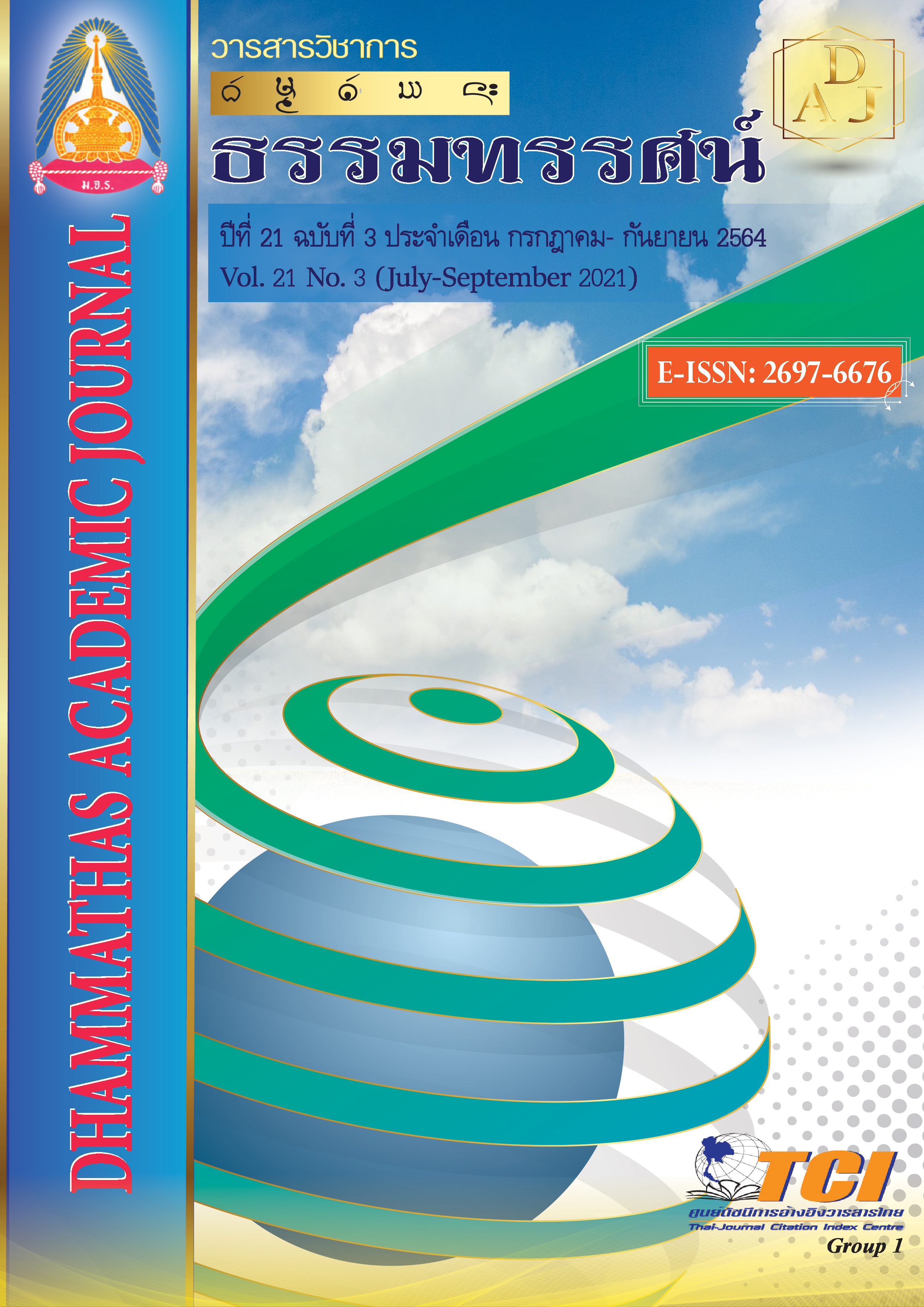Developing Indicators of Learning Organization in Special Education School Northeast
Main Article Content
Abstract
The Objectives of this research were: 1) to develop the indicators of Learning Organization (LO) in special education schools and 2) to test the congruence of the model which was constructed with the empirical data. It is a quantitative research. The research was conducted in two stages: Stage 1, development of the indicators of Learning Organization in special education schools by literature review, a focus group discussion by 7 experts and a synthesis of the indicators; Stage 2, test to confirm the indicators of LO in special education school which were purposively chosen. The research instruments were 5-level rating scale questionnaires with the overall reliability value of 0.93 and IOC of 0.86-1.00. A computer program was used to analyze the data.
The research found the following:
1. Indicators of Learning Organization in special education schools were developed, consisting of 5 main factors, 28 sub-factors and 133 indicators, consequential of principles, concepts and theories related to LO in special education schools.
2. In testing the congruence of the constructed confirmatory factors analysis of the LO indicators for special education schools with the empirical data, it was found to be congruence, with the following statistical values: Chi-Square = 287.40, df = 251, P-value = 0.05690, RMSEA = 0.015, An analysis of the model showing relationships among the main factors of LO, it was found on the whole that all 5 factors, i.c. organization, educational administration and management, creating learning society and technology, carried a load with statistically significant value = 0.50. On the whole the factor with the heaviest weight was the main factor of technology, followed next by the main factors of creating learning society, organization, educational administration and management and learning respectively. Special education schools can make use of all or parts of these indicators which are appropriate and congruent with their own LO in the planning, administering and evaluation so as to create LO character of their institutions.
Article Details
References
กระทรวงศึกษาธิการ. (2551). พระราชบัญญัติการจัดการศึกษาสำหรับคนพิการ พ.ศ. 2551. กรุงเทพฯ: สำนักงานปลัดกระทรวงศึกษาธิการ.
จำเรียง วัยวัฒน์ และเบญจมาศ อ่ำพันธุ์. (2540). วินัย 5 ประการ พื้นฐานองค์กรเรียนรู้. (พิมพ์ครั้งที่ 2). กรุงเทพฯ: เอ็กซ์เปอร์เน็ท.
เชาวนี นาโควงศ์. (2551). สมรรถนะการปฏิบัติงานของครูในโรงเรียนการศึกษาพิเศษ สังกัดสำนักงานคณะกรรมการการศึกษาขั้นพื้นฐาน. (วิทยานิพนธ์การศึกษามหาบัณฑิต). มหาสารคาม: มหาวิทยาลัยมหาสารคาม.
นิตยา สำเร็จผล. (2547). การพัฒนาตัวบ่งชี้การเรียนรู้ตลอดชีวิต. (ปริญญานิพนธ์การศึกษาดุษฎีบัณฑิต). กรุงเทพฯ: มหาวิทยาลัยศรีนครินทรวิโรฒ.
เนตรพัณณา ยาวิราช. (2546). การจัดการสมัยใหม่: Modern management. (พิมพ์ครั้งที่ 2). กรุงเทพฯ: เซ็นทรัลเอ็กซเพรส.
วิโรจน์ สารรัตนะ. (2548). ผู้บริหารโรงเรียน: สามมิติการพัฒนาวิชาชีพสู่ความเป็นผู้บริหารที่มีประสิทธิภาพ. กรุงเทพฯ: ทิพย์วิสุทธิ์.
วิลาวัลย์ มาคุ้ม. (2549). การพัฒนาตัวบ่งชี้การจัดการความรู้ของครูในสถานศึกษาขั้นพื้นฐาน สังกัดกระทรวงศึกษาธิการ. (วิทยานิพนธ์การศึกษาดุษฎีบัณฑิต). กรุงเทพฯ: มหาวิทยาลัยศรีนครินทรวิโรฒ.
เศาวนิต เศาณานนท์. (2542). ภาวะผู้นำ. นครราชสีมา: สถาบันราชภัฏนครราชสีมา.
สมคิด สร้อยน้ำ. (2547). การพัฒนาตัวแบบองค์การแห่งการเรียนรู้ในโรงเรียนมัธยมศึกษา. (วิทยานิพนธ์ศึกษาศาสตรดุษฎีบัณฑิต). ขอนแก่น: มหาวิทยาลัยขอนแก่น.
สมหวัง พิธิยานุวัฒน์. (2551). วิธีวิทยาการประเมินศาสตร์แห่งคุณค่า. (พิมพ์ครั้งที่ 4). กรุงเทพฯ: จุฬาลงกรณ์มหาวิทยาลัย.
สำนักงานปฏิรูปการศึกษา. (2545). แนวทางบริหารและการจัดการศึกษาในเขตพื้นที่การศึกษา และสถานศึกษา. กรุงเทพฯ: สำนักงานปฏิรูปการศึกษา.
สุภมาส อังศุโชติ และคณะ. (2551). สถิติวิเคราะห์สําหรับการวิจัยทางสังคมศาสตร์และพฤติกรรมศาสตร์: เทคนิคการใช้โปรแกรม LISREL. กรุงเทพฯ: มิสชั่น มีเดีย จํากัด.
สุรพงศ์ เอื้อศิริพรฤทธิ์. (2547). การพัฒนาตัวบ่งชี้รวมความเป็นองค์กรแห่งการเรียนรู้ของสถานศึกษาขั้นพื้นฐานในจังหวัดภาคใต้. (วิทยานิพนธ์การศึกษาดุษฎีบัณฑิต). กรุงเทพฯ: มหาวิทยาลัยศรีนครินทรวิโรฒ.
Garvin, D. A. (2003). Learning in Action. Boston: Harvard Business Press.
Hoy, W. K., & Miskel, C. G. (2005). Educational Administration: Theory, Research and Practice. New York: McGraw-Hill.
Kimbrough, R., & Nunnery, M. (1998). Educational Administration An Introduction. New York: Macmillan.
Lindeman, R. H., Merenda, P. F., & Gold, R. Z. (1980). Introduction to bivariate and multivariate analysis. Glenview, Illinois: Scott, Foresman and Company.
Lunenburg, F. C., & Ornstein, A. C. (2000). Educational Administration: Concept and Practices. (3rd ed.). Belmont: Wadsworth.
Marquardt, M. J. (1996). Building the Learning Organization: A System Approach to Quantum Improvement and Global Success. New York: McGraw-Hill.
Senge, P. M. (1990). The fifth discipline: The art and practice of the learning organization. London: Century Press.

